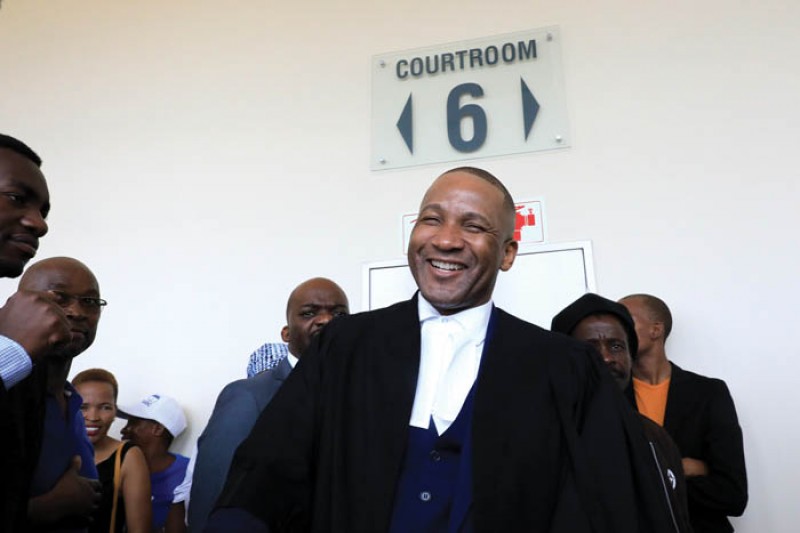Fight to farm hemp turns legal
Mpho Mokwape | Friday August 21, 2020 15:47


Barend Daniel de Beer, Fresh Standard’s director, says he invested millions of pula into the project based on an exemption granted by former agriculture minister, Patrick Ralotsia, only for police to raid and uproot his fledgling crops last May.
At that point, the company had purchased and planted 30 different cannabis sativa (hemp) seeds in order to assess which strain would thrive in the conditions on the farm, which belonged to Ralotsia. Seeds costing more than €90,000 had been bought and an offtake agreement to produce 5,000 litres of hemp oil per month, signed. Hemp, or industrial hemp, is known as a variety of the cannabis sativa plant species that is grown specifically for the industrial or medicinal uses of its derived products.
Police uprooted and confiscated the young plants after arguing that the exemption had been withdrawn and the crop was actually dagga, a prohibited drug with psychedelic effects on humans.
In documents before the High Court, de Beer wants the revocation of the permit reviewed and set aside. The case is scheduled for December 3, 2020 and de Beer is represented by McErick Attorneys who have since briefed Advocate Duma Boko to lead the application.
de Beer says in October 2018, he received the exemption to grow, process and produce products from cannabis sativa and hemp dominant strands for medical and industrial purposes in the country.
The director says following the granting of the exemption he spent millions of pula in establishing the business and that it was with the knowledge of the Ministry and the then minister and his permanent secretary (PS).
“On or about May 7, 2019 representatives of the Narcotics Squad of the Police arrived at the farm where I had planted the crop in green house tunnels. They uprooted the plants and removed them from the farm,” reads de Beer’s founding affidavit.
He said the move by the government forced him to make an urgent enquiry as to why the uprooting happened as the company was operating lawfully and that he later obtained a copy of a letter from the Ministry dated March 29, 2019 signed by the PS withdrawing the exemption.
It is de Beer’s contention that the communication about the withdrawal was illegal in that it was contrary to the empowering statute and unreasonable because the decision was made without affording him any form of hearing despite the serious effect that the decision had on his business.
According to his documents, de Beer explained that the interest to grow the plant was for the economic benefit of the country and that he had numerous meetings with the then Minister as he explained the plant, its use and benefits while making his interest clear about wanting to produce it. “Following meetings with the then Minister, the PS and representatives of the ministry, on September 7, 2018, the PS signed a letter to me which reads, ‘The ministry of agriculture has no objection to Fresh Standard a registered company in Botswana’.”
de Beer said later he also received another letter informing him that the Ministry had embraced his proposal and indicated that it would assist where possible for various accesses to available lands through various initiatives and schemes in the country.
de Beer said from all the letters he received thereafter and their discussions with the Minister, he knew that Ralotsia was the one who approved the arrangement.
“For that reason towards end of December 2018 we commenced with the pilot project. Purchased and planted 30 different cannabis sativa seeds in order to assess which strain would thrive in the conditions on the minister’s farm,” he said.
de Beer said however after things had taken off and even with the minister, PS and other representatives having visited the farm on a number of occasions showing interest in the project, matters took a different twist. He pointed out that law enforcement officers visited and two police officers were deployed to secure the cultivation and later the plants were uprooted and that there was confirmation from the Botswana Police Service through its Narcotics, Flaura and Fauna Department that the crop was ‘motekwane’.
“Later I was given a copy of the report from Chief Forensic Scientific Officer based at the Police Forensic Laboratory in Gaborone. She confirmed that the plants were cannabis. This is of course surprising because the report however does not analyse the THC content of the plants,” he said. de Beer’s contention was that the PS knew that significant money had been invested in the project and that the minister granted permission for exemption.
He also argued that Fresh Standard was not granted any opportunity to be heard on the matter and the current minister has declined their requests to meet with him.
“I submit that the withdrawal of March 29, 2019 by the Ministry of Agriculture was unfair, unprofessional and unlawful. Further, that if the PS made the decision, he had no authority to withdraw the exemption without the Minister’s directive and or authority. This will be established in the record of the rules of court,” he said. The case is expected to spark debate on hemp production in the country, with government having sent mixed signals on the issue over the years.
